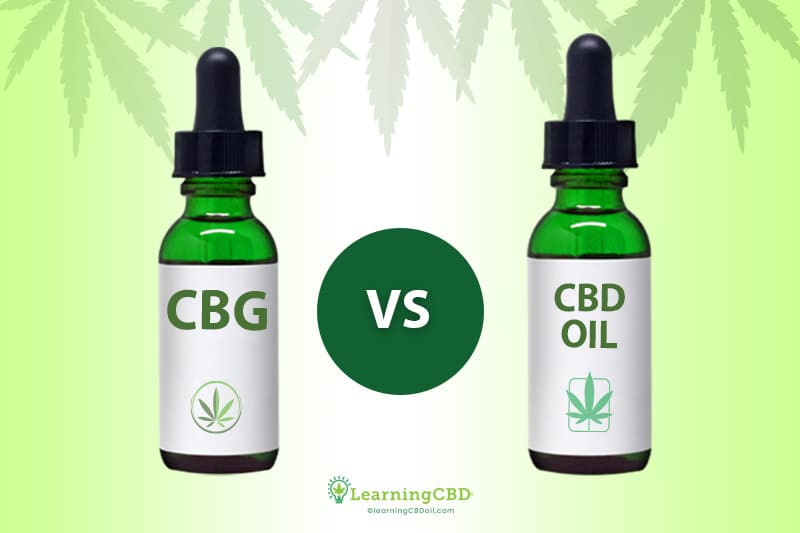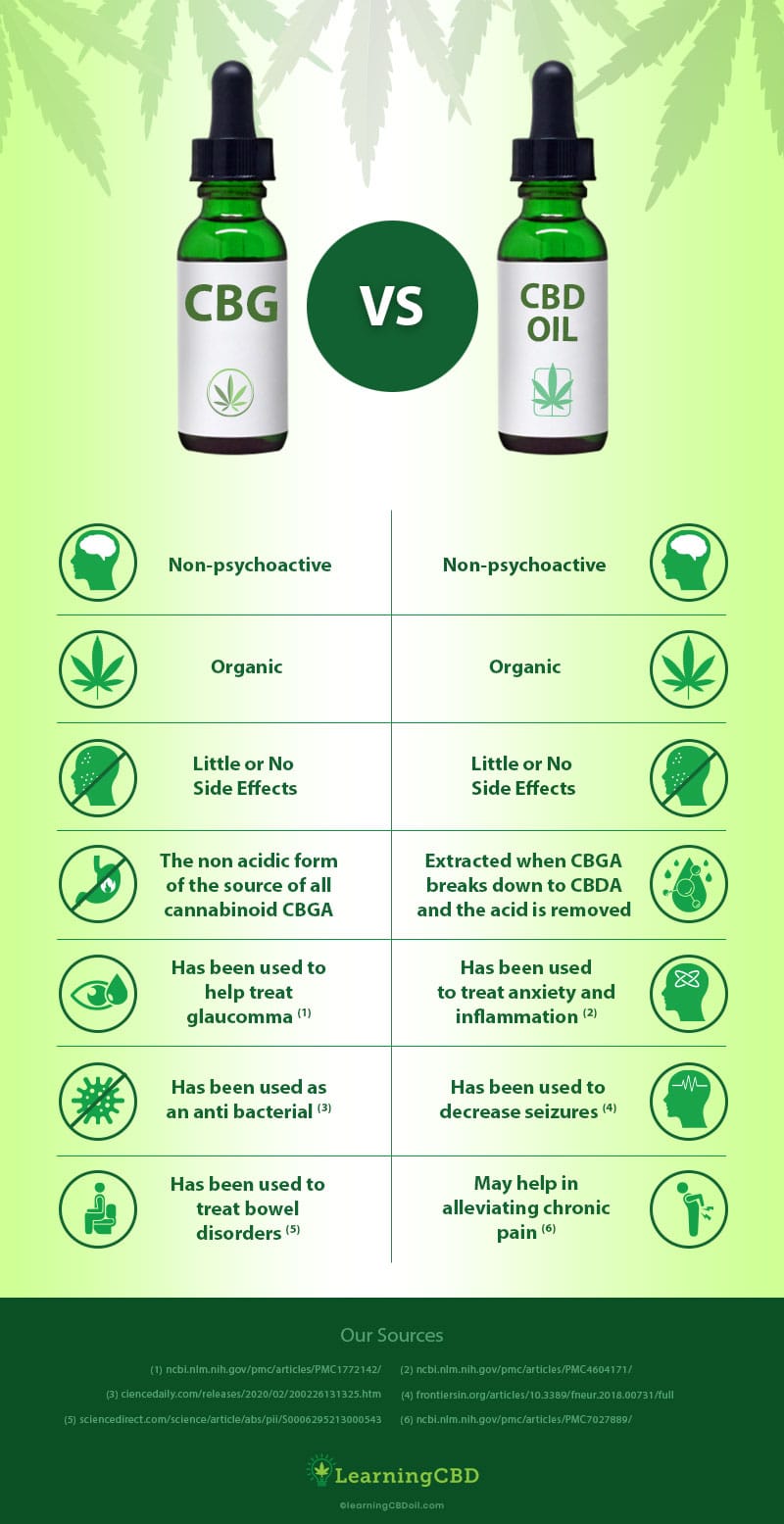Before we detail some of the most important differences between CBG and CBD, we should mention that they share quite a few common traits. Both CBD and CBG are cannabinoids, although CBD derives from CBG. Another common trait is their non-psychotropic nature, meaning that consuming them will not get you “high.”
CBG and CBD play different roles when consumed, affecting different bodily functions, yet overlap in some medical and therapeutic benefits. In some areas, such as appetite, CBG shows strong potential, while CBD does little to affect it in humans.
Also, due to the lower amounts of CBG found in cannabis plants, it is difficult to estimate the potency of CBG when it comes to some medicinal and pharmacological applications. CBD is much more plentiful, and its effects are easier to track and compare.
Benefits of CBG
It’s important to note that at this time, no clinical studies are complete and on the record confirming the medicinal benefits of CBG in humans. Although the results of studies on rats and other animals are encouraging and should translate well, it is essential to manage expectations when it comes to CBG until there is more solid scientific evidence.
With that in mind, we see no harm in listing some of the conditions and areas where CBG should shine.
Treatment of Glaucoma and Intraocular Pressure
One of the main benefits of THC and other cannabinoids have been their application in the treatment of glaucoma and regulating intraocular pressure. Unfortunately, THC is a psychotropic cannabinoid that causes intoxication, making it unsuitable for all patients.
CBD shows no ability to treat glaucoma and intraocular pressure on its own, and this is where CBG makes an entrance. A study conducted in 1990 explored the applications of CBG to glaucoma and intraocular pressure and found that CBG and other related cannabinoids have therapeutic potential for the treatment of these conditions.
Antibacterial Applications and MRSA
MRSA or Methicillin-resistant Staphylococcus aureus is an extremely resistant form of bacteria that renders many antibiotics useless. It is a common cause of severe and even deadly staph infections that are very difficult to treat.
In a study by McMaster University, CBG shows antibiotic activity and proved effective when it comes to targeting pathogenic bacteria such as MRSA. This highlights plenty of potential for the use of CBG and other cannabinoids as antibiotics in the future. Antibiotic resistance is a growing problem in the medical community, so CBG and other cannabinoids could be a welcome treat.
Treatment of Inflammatory Bowel Disease and Colitis
A study carried out in 2013 tested CBG for potential pharmacological applications for the treatment of inflammatory bowel disease (IBD) and colitis. Although the research was conducted on rats, the results were positive, and CBG was successful in managing abdominal pain, as well as reducing the effects of cramping, diarrhea, poor appetite, weight loss, and nausea.
Treatment of Anxiety
One of the functions of CBG is to prohibit the uptake of GABA, which leads to a reduction in anxiety, muscle relaxation, tension relief, and a calming sensation in the body and mind. Pharmacology already produces a number of medications that use GABA inhibitors to treat anxiety. CBG shows excellent promise in this area with no know side effects that are present in other GABA inhibitors.
Cancer Treatment
It is important to note that no research states that CBG alone has a substantial impact on curing and eliminating cancer cells, but rather that it represents an excellent complementary treatment for those who suffer from some types of cancer.
Scientists cite laboratory studies as evidence of CBG acting as an inhibitor to the growth of certain types of cancer cells. Several pre-clinical studies have all confirmed that CBG, along with other cannabinoids, shows positive effects on slowing the growth of tumors and cancer cells. One study from 2014 shows positive effects of CBG on slowing and inhibiting the growth of colon cancer. Similar studies from 2009, 2016, and 2006 have all demonstrated similar effects on CBG to different types of cancers.
As previously mentioned, these studies used non-psychotropic cannabinoids derived from plants as a group, rather than isolating the individual compounds such as CBG. Still, the overall results show a lot of promise, and further research will be able to reveal more about the role that CBG plays.
Treatment of Huntington’s and Other Neurodegenerative Diseases
In 2015, a study carried out on mice showed that CBG, in combination with other cannabinoids or therapies, shows promise as a potential treatment for neurodegenerative diseases. Huntington’s disease is a hereditary neurodegenerative disease that has no cure, and there is high hope that breakthroughs in cannabinoid research will enable scientists to find applications for CBG and other cannabinoids in treating it.
The study shows that CBG normalizes the expression of abnormal genes that play a vital role in brain function degeneration. Additionally, CBG and other cannabinoids showed an ability to act as neuroprotective compounds.
Reducing Inflammation
The encouraging signs of CBG applications to treat conditions such as IBD carry over into other types of inflammation. Much of this research has focused on dermal inflammation, as CBG shows excellent potential in reducing skin inflammation and related disorders, such as psoriasis and eczema.
On top of all that, research involving CBG failed to find or associate any side effects with the consumption of CBG. This presents an enormous opportunity for research and exploring potential applications of CBG for the treatment of conditions where drugs with severe side effects are the norm.
The Future of CBG and Other Cannabinoids
The stigma associated with the cannabis plant, as well as legal and administrative obstacles to cannabis-related research and studies, have slowed down the progress of medical research. Thankfully, there’s now a consensus and commitment to researching the benefits and therapeutic applications of the cannabis plant, and we find ourselves in the midst of a revolution in modern medicine.
While cannabinoids such as THC, CBD, and CBC are the most popular and have been a focus of countless scientific studies, lesser-known ones such as CBG are finally getting some limelight. Formal clinical studies pertaining to CBG in humans do not exist yet. Still, the buzz around the compound is positive, and the support is growing.
With potential applications in the treatment of colitis, IBD, neurodegenerative diseases, glaucoma, intraocular pressure, and various forms of cancer, CBG seems to be on the verge of exploding as the new “miracle” compound that will find widespread acclaim.
One of the main obstacles in this process is the extraction of CBG from plants, as most cannabis plants contain less than 1% of CBG in total. This affects both the price and the availability of CBG for medical research. Eventually, this obstacle will seem minuscule if CBG research finds a formal application in medicine.
FAQ’s on CBG vs. CBD
Question: Can CBG get you high?
Answer: No. CBG will not get you high. Both CBD and CBG are non-psychotropic in nature.
Question: What are the benefits of CBG?
Answer: Although clinical studies are still being conducted, some of the potential benefits of CBG include treatment of glaucoma, treatment of inflammatory bowel disease, treatment for anxiety, reduce inflammation, etc.
Question: Can you use CBG as a treatment for glaucoma?
Answer: Although further research is needed, there is a potential that CBG can be used to treat glaucoma.
Question: Can you use CBG as an antibiotic?
Answer: There is a high potential that CBG can be used as an antibiotic in the future. One study by Mcmaster university shows that CBG is proved to be effective when it comes to targeting pathogenic bacteria.
Question: Can you use CBG as a treatment for anxiety?
Answer: Yes. Because one of the functions of CBG is to prohibit the uptake of GABA (Gamma-Aminobutyric Acid) which leads to a reduction of anxiety, muscle relaxation, tension relief, and a calming sensation of the body and mind.
Question: Can you use CBG to treat cancer?
Answer: Although further research is needed, there is a potential that CBG can be used to treat cancer. One study from 2014 shows positive effects of CBG on slowing and inhibiting the growth of colon cancer.
Feel free to steal this image for your own site. All we ask is for proper attribution.











